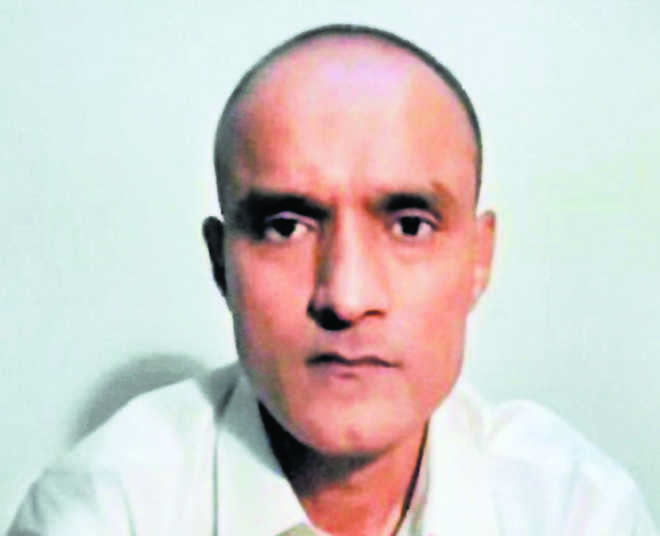
Bharat H. Desai and Balraj K. Sidhu
Bharat H. Desai and Balraj K. Sidhu
Desai is Nehru Chair and Professor of International Law at JNU, New Delhi. Sidhu is faculty at IIT-Kharagpur
THE news has finally come that Pakistan has granted visa to Kulbhushan Jadhav's mother and wife to meet him on December 25. An Indian High Commission official will also be allowed to accompany them. This proves that seriousness has dawned upon the Pakistani establishment as regards fear of state responsibility emanating from the pending case before the International Court of Justice (ICJ) for consistent denial of consular access to Jadhav. It seems to be too little and too late to mitigate Pakistan's responsibility.
The calibrated International Law remedy invoked by India has placed Pakistan in a tight corner. In a way, this Indian move underscores the beauty and majesty of the International Law for the peaceful settlement of disputes. The case shows the risk undertaken by Pakistan on the Jadhav issue. It has contributed in the plummeting of bilateral relations to its nadir.
Consular access as a right
The Jadhav case provides a refreshing instance of Indian support to a national facing a serious charge in another country. India was forced to pursue this course since denial of consular access nullified the possibility of due process and 'exhaustion of local remedies'. The case involves breach of an international treaty obligation, ie the Vienna Convention on Consular Relations, 1963 (the Convention). It has been contended that Pakistan's refusal to allow Indian consular access to Jadhav "has prevented India from exercising its rights under the Convention and has deprived the Indian national from the protection accorded under the Convention."
Compulsory jurisdiction
The Jadhav case represents a growing trend in which a state party seeks to raise the issue of a breach of a specific treaty obligation by another state. For instance, Ukraine has taken the Russian Federation to the ICJ for a breach of the Convention for the Suppression of the Financing of Terrorism as well as the Convention on Elimination of all Forms of Racial Discrimination. It led the ICJ to order provisional measures against Russia.
Provisional measures
The Indian petition has asked the court to indicate forthwith provisional measures proprio motu. The court had already pointed out in the Breard case (Paraguay vs USA; April 9, 1998) that it is established rule to order interim measures in cases where there is possibility of "irreparable prejudice…to rights which are the subject of dispute." Thus, ICJ President Rony Abraham asked Pakistan to "act in such a way so as to enable the court to enforce any decision it takes on the Indian plea.'' It also scheduled prompt hearing in the matter and three days later, indicated 'provisional measures' till a final decision in the matter.
The Indian contention (rooted in Article 36 (1) of the Convention) is for unimpeded consular communication and legal representation by a 'sending state' to its nationals. This is a cogent step to obtain judicial restraint on Pakistan's conduct.
In 1979, the US took Iran to the ICJ against the seizure of its embassy in Tehran in violation of the Vienna Convention. ICJ emphatically ruled that Iran violated its obligations under international conventions as well as under long-established rules of general international law. Similarly, in the La Grand case (1999), the ICJ upheld the German contention that the US violated the Vienna Convention on Consular Relations by not advising two of its detained nationals their right to consular access that prevented an effective trial counsel to represent them.
ICJ Order of May 18, 2017
As a sequel to oral hearing held on May 15, 2017, the ICJ quickly issued an order for 'provisional measures'; as per ICJ practice, it can indicate provisional measures only if there is prima facie satisfaction as regards the basis for jurisdiction in the case.
Since India chose to rely upon jurisdiction under Article 36 (1) of the ICJ Statute, the court didn't examine Pakistan's application of reservations made under Article 36 (2). It also brushed aside the Pakistani contention that consular access could not have been intended to apply in cases of espionage/terrorism. On the 2008 bilateral agreement between India and Pakistan that allowed latitude on "political or security grounds", India contended that any bilateral agreement cannot be seen to 'dilute' the overarching protection laid down in the Vienna Convention.
In order to determine its prima facie jurisdiction, the court categorically asserted that it considers failure by Pakistan and ruled that "Pakistan shall take all measures at its disposal to ensure that Mr Jadhav is not executed pending the final decision in these proceedings and shall inform the Court of all the measures taken in implementation of the present Order."
Grant of visa a face-saver?
By an order of June 13, 2017, the ICJ scheduled the time limit for the filing of the Indian memorial by September 13 and the Pakistani counter-memorial by December 13. Since this process is complete, oral hearings on the merits of the case are likely to take place in early 2018.
Thus, the timing of the grant of visa to Jadhav's family members is understandable. Their meeting with Jadhav, in the presence of an Indian High Commission official, has not been given colour of a formal 'consular access'. Still, it has all the trappings of such access that was consistently sought by India during 2016-17. Its purpose seems to create a fait accompli and provide the much-required cushion to lessen the ICJ's likely opprobrium.
If one considers the outcome in recent cases (Breard, LaGrand and Avena) of denial of consular access, Pakistan faces the prospect of falling between two stools in the Jadhav case as a violation of the International Law cannot be mitigated by camouflaged access to family members. Notwithstanding belated registration of the 2008 India-Pakistan Agreement on Consular Access on May 17, 2017, "political or security'' grounds alone cannot override obligations under the Vienna Convention.



























